Kathleen Jones's Blog, page 32
May 4, 2015
Tuesday Poem: The Shipwright's Love Song - Jo Bell
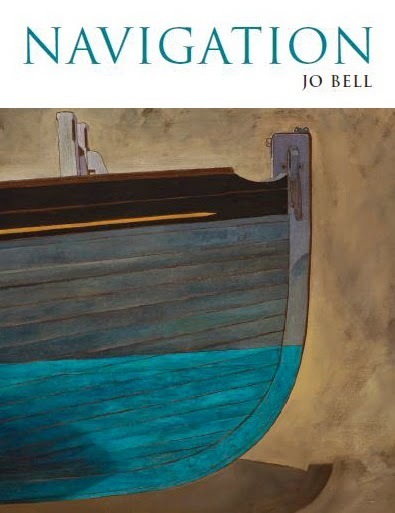 Oh, but the lines of her!
Oh, but the lines of her!The curve and glinting swell –
the smell, as sweet as pitch pine,
thick and hot as tar.
Oh, I was launched and splashing in the slipway,
happy to be rudderless
and yawing, mast head
touching to the foam.
Oh, but her skin was salt,
was starred with gasping salt beneath my tongue,
and slowly
she came round to me –
bucking and slipping at my touch,
making way in fits and starts
to reach me and be calm.
Later, long before she rocked me into sleep
I saw the seas, saw all of them in one blue ache:
unlandmarked, vast; horizonless.
© Jo Bell 2003
from Navigation, published by Moormaid Press Listen to Jo reading the poem on YouTube here .
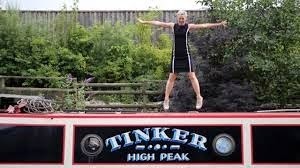
Jo Bell was born in Sheffield and grew up on the edge of the Peak District. She became an industrial archaeologist before being seduced by boats. Narrow boats. She now lives on a narrow boat and is Britain's Canal Laureate. Jo has won several major poetry prizes. Navigation was her first collection, and her second - Kith - has just been published by Nine Arches Press. Listen to Jo read some of the poems from the collection on Sound Cloud.
She blogs at The Belljar
 The Tuesday Poets are an international group who try to post a new poem every Tuesday and take turns to edit the main hub. Today it's my turn to be editor and I've chosen the poem 'Taken' from Jo's new collection Kith. Click on this link to take a look.
The Tuesday Poets are an international group who try to post a new poem every Tuesday and take turns to edit the main hub. Today it's my turn to be editor and I've chosen the poem 'Taken' from Jo's new collection Kith. Click on this link to take a look.
Published on May 04, 2015 10:20
May 3, 2015
Austerity: Moving Money from the Have-Nots to the Have-Yachts
Lately I've been reading a gripping and addictive book that has at times shocked me so much I've had to put it down. But this is not fiction, it's cold fact.
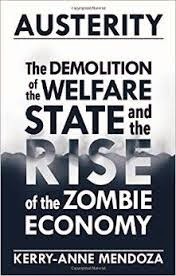
I'm reading Austerity by Kerry-Anne Mendoza who left a successful and highly lucrative career in banking to be part of the Occupy Movement. She has insider knowledge of the economic system that is returning us to levels of inequality not seen since the 19th Century. Whatever your political persuasion, the evidence - the facts and figures - are indisputable. This book has 5 star reviews and - if ever a book should be able to change the world - this book is it. Everyone should read it, but the people who really need to probably won't.
Mendoza traces the origins of the Austerity movement to 1944 and the political and economic measures that were set in place to rebuild the architecture of the post-war global economy. It was rooted in neo-liberal capitalist ideas based on unlimited growth which was to be accomplished through de-regulation of the financial system and the international trade network. These ideas were to be implemented by the International Monetary Fund, the World Bank and the World Trade Organisation and it was in reality Economic Colonialism. Countries in Africa and Latin America were sucked into the Debt Trap and laid waste by Austerity, long before it happened in the West.
Created to rebuild shattered war time economies, these institutions 'continue to set the roadmap for domestic and international policy to this day', over-ruling democratically elected governments and environmental groups. There has been a gradual transfer of power from the State to private corporations. We have now arrived at a point where individual global corporations are richer and more powerful than governments.
Mendoza is particularly lucid on the financial crisis of 2007/8 and the part played by de-regulation of the financial markets, the growth of derivatives and the selling on of bad debts to institutions who then took out insurance policies to protect themselves against defaults. When the bubble burst, the banks were bailed out to the tune of £850 billion in the UK alone - twice the nation's annual budget. So a toxic private debt was converted into public debt. And we're the ones paying for it. Austerity was then wheeled in to make sure that we did.
It's called the Zombie Economy - the dark side of our financial institutions, sucking all the value out of them and leaving us with the bill. Only the 1% at the top make any money. Mendoza uses water to illustrate how it works. We all need water, but there are only a finite number of people drinking it and using it. How to grow your market and increase your profits?
1. Set out to gain control of the water supply and production. Now what?
2. Then you get people to buy shares in your company.
3. Then you can pay people to work for you and you can cream off a profit. But it needs to carry on growing.
4. You get people to bet on whether the price of water will go up or down (futures - a favourite derivative).
5. You can now manipulate the market in order to make more profit. You can even place bets yourself on whether the price will go up or down.
But for the consumer the price is always going up to pay - not just for the water - but for the profits and losses of all the people now in this corporate chain.
Almost the whole of our lives have now been swallowed by the corporate monster - our hospitals and schools (most of us are unaware of the mechanics of PFI in the health service or the funding of Academies). Mendoza is particularly scary on the facts and figures of the destruction of the NHS as is it sold piece-meal to private providers. How many of us know that our GP practices are privately owned now? Only a few remain as originally intended. Education is going the same way, alongside the welfare system which is the safety net for those who are less fortunate. 'You can't run a public service like a business', Kerry-Anne wrote in a Guardian article . They were created to 'serve' a public interest. But -
"The reality is that, wherever we look, all our major institutions meant to protect and serve the long-term public interest are stuffed with individuals who have abandoned this role in favour of their own short-term self-interest."
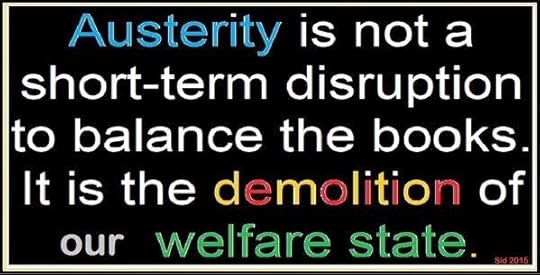
She quotes the Stafford hospital case as an example of what happens when commercial values replace the values of healthcare, when meeting a target is more important than whether a patient lives or dies. Using material obtained under the Freedom of Information Act, she reveals that in 2013 52 NHS staff have been paid £2 million in gagging orders, banning them from reporting 'significant failures of private healthcare providers operating NHS contracts'. Prior to 2013, 'more than £15 million was spent silencing 600' staff. We should all be worried.
When I read the facts and figures of what is happening to the social security system, I wept. The numbers of suicides, of hungry children having to be fed at school (this is making a huge hole in school budgets), of desperate single parents whose benefits have been stopped because they missed appointments, people with disabilities denied care, people dying of cancer being told that they had to work or have their benefits cut (one received the letter the week before they died). The scandal of the Atos assessments (for which it was paid £206 million). There are a number of case histories, all carefully documented and figures that can be verified. Foodbanks, once rare, are now operating in almost every county of Britain.
Meanwhile corporate salaries have continued to increase - bankers salaries and bonuses are back to pre-crisis levels. The Sunday Times rich-list recently revealed that the rich are now twice as rich as they were before the crisis. And Austerity has failed to restore the economy - growth is slowing (0.3 now, down from 0.6 in the previous quarter) and there are negative interest rates in Europe now - which effectively means paying people to borrow which is so crazy you can't imagine anyone doing it. They haven't reached the UK yet, but the only thing keeping things from going under is the printing of money to fling into the wild waters of the economy - called Quantatitive Easing - but perhaps better known as Questionable Economics.
"This is not an economic recovery by any reasonable definition of the term. What is the point of GDP growth, if the benefits are not increasing the quality of our lives? . . . Hunger, poverty and homelessness rising exponentially in a time of economic growth can only ever be a political choice. . . It is the deliberate destitution of the many, to benefit the few".
I don't like corporate Britain where the only values are profit and infinite growth, where the environment gets plundered for diminishing returns and people simply become units of consumption. I want a fair society which benefits us all - one in which we preserve the environment, our heritage, for future generations. Where the sick get the treatment they need and children get the education they deserve. Where everyone has a roof over their heads and everyone has enough to eat. We have the resources to do it, we just need the political will. In a democracy that means US.
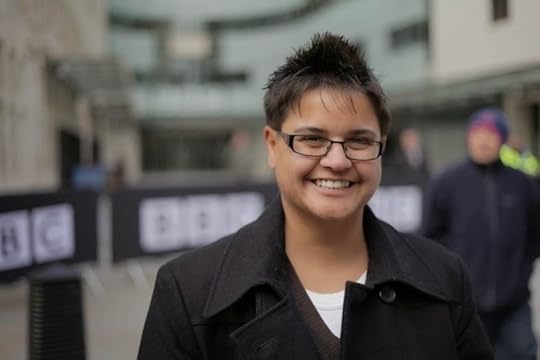
Kerry-Anne Mendoza is a left-wing economist and journalist who blogs at the Scriptonite Daily

I'm reading Austerity by Kerry-Anne Mendoza who left a successful and highly lucrative career in banking to be part of the Occupy Movement. She has insider knowledge of the economic system that is returning us to levels of inequality not seen since the 19th Century. Whatever your political persuasion, the evidence - the facts and figures - are indisputable. This book has 5 star reviews and - if ever a book should be able to change the world - this book is it. Everyone should read it, but the people who really need to probably won't.
Mendoza traces the origins of the Austerity movement to 1944 and the political and economic measures that were set in place to rebuild the architecture of the post-war global economy. It was rooted in neo-liberal capitalist ideas based on unlimited growth which was to be accomplished through de-regulation of the financial system and the international trade network. These ideas were to be implemented by the International Monetary Fund, the World Bank and the World Trade Organisation and it was in reality Economic Colonialism. Countries in Africa and Latin America were sucked into the Debt Trap and laid waste by Austerity, long before it happened in the West.
Created to rebuild shattered war time economies, these institutions 'continue to set the roadmap for domestic and international policy to this day', over-ruling democratically elected governments and environmental groups. There has been a gradual transfer of power from the State to private corporations. We have now arrived at a point where individual global corporations are richer and more powerful than governments.
Mendoza is particularly lucid on the financial crisis of 2007/8 and the part played by de-regulation of the financial markets, the growth of derivatives and the selling on of bad debts to institutions who then took out insurance policies to protect themselves against defaults. When the bubble burst, the banks were bailed out to the tune of £850 billion in the UK alone - twice the nation's annual budget. So a toxic private debt was converted into public debt. And we're the ones paying for it. Austerity was then wheeled in to make sure that we did.
It's called the Zombie Economy - the dark side of our financial institutions, sucking all the value out of them and leaving us with the bill. Only the 1% at the top make any money. Mendoza uses water to illustrate how it works. We all need water, but there are only a finite number of people drinking it and using it. How to grow your market and increase your profits?
1. Set out to gain control of the water supply and production. Now what?
2. Then you get people to buy shares in your company.
3. Then you can pay people to work for you and you can cream off a profit. But it needs to carry on growing.
4. You get people to bet on whether the price of water will go up or down (futures - a favourite derivative).
5. You can now manipulate the market in order to make more profit. You can even place bets yourself on whether the price will go up or down.
But for the consumer the price is always going up to pay - not just for the water - but for the profits and losses of all the people now in this corporate chain.
Almost the whole of our lives have now been swallowed by the corporate monster - our hospitals and schools (most of us are unaware of the mechanics of PFI in the health service or the funding of Academies). Mendoza is particularly scary on the facts and figures of the destruction of the NHS as is it sold piece-meal to private providers. How many of us know that our GP practices are privately owned now? Only a few remain as originally intended. Education is going the same way, alongside the welfare system which is the safety net for those who are less fortunate. 'You can't run a public service like a business', Kerry-Anne wrote in a Guardian article . They were created to 'serve' a public interest. But -
"The reality is that, wherever we look, all our major institutions meant to protect and serve the long-term public interest are stuffed with individuals who have abandoned this role in favour of their own short-term self-interest."

She quotes the Stafford hospital case as an example of what happens when commercial values replace the values of healthcare, when meeting a target is more important than whether a patient lives or dies. Using material obtained under the Freedom of Information Act, she reveals that in 2013 52 NHS staff have been paid £2 million in gagging orders, banning them from reporting 'significant failures of private healthcare providers operating NHS contracts'. Prior to 2013, 'more than £15 million was spent silencing 600' staff. We should all be worried.
When I read the facts and figures of what is happening to the social security system, I wept. The numbers of suicides, of hungry children having to be fed at school (this is making a huge hole in school budgets), of desperate single parents whose benefits have been stopped because they missed appointments, people with disabilities denied care, people dying of cancer being told that they had to work or have their benefits cut (one received the letter the week before they died). The scandal of the Atos assessments (for which it was paid £206 million). There are a number of case histories, all carefully documented and figures that can be verified. Foodbanks, once rare, are now operating in almost every county of Britain.
Meanwhile corporate salaries have continued to increase - bankers salaries and bonuses are back to pre-crisis levels. The Sunday Times rich-list recently revealed that the rich are now twice as rich as they were before the crisis. And Austerity has failed to restore the economy - growth is slowing (0.3 now, down from 0.6 in the previous quarter) and there are negative interest rates in Europe now - which effectively means paying people to borrow which is so crazy you can't imagine anyone doing it. They haven't reached the UK yet, but the only thing keeping things from going under is the printing of money to fling into the wild waters of the economy - called Quantatitive Easing - but perhaps better known as Questionable Economics.
"This is not an economic recovery by any reasonable definition of the term. What is the point of GDP growth, if the benefits are not increasing the quality of our lives? . . . Hunger, poverty and homelessness rising exponentially in a time of economic growth can only ever be a political choice. . . It is the deliberate destitution of the many, to benefit the few".
I don't like corporate Britain where the only values are profit and infinite growth, where the environment gets plundered for diminishing returns and people simply become units of consumption. I want a fair society which benefits us all - one in which we preserve the environment, our heritage, for future generations. Where the sick get the treatment they need and children get the education they deserve. Where everyone has a roof over their heads and everyone has enough to eat. We have the resources to do it, we just need the political will. In a democracy that means US.

Kerry-Anne Mendoza is a left-wing economist and journalist who blogs at the Scriptonite Daily
Published on May 03, 2015 15:12
April 27, 2015
Tuesday Poem: The Great Vision by Black Elk (Sioux)
'... Now I knew the sixth Grandfather was about to speak, he who was the Spirit of the Earth, and I saw that he was very old, but more as men are old. His hair was long and white, his face was all in wrinkles and his eyes were deep and dim. I stared at him, for it seemed I knew him somehow; and as I stared, he slowly changed, for he was growing backwards into youth, and when he had become a boy, I knew that he was myself with all the years that would be mine at last. When he was old again, he said: "My boy, have courage, for my power shall be yours, and you shall need it, for your nation on the earth will have great troubles. Come."
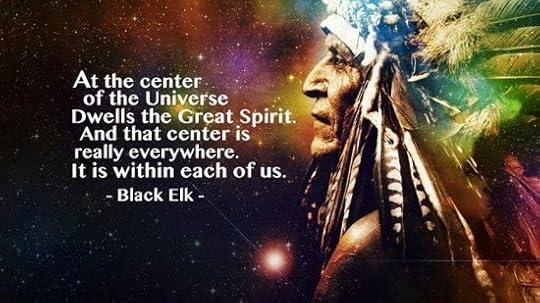
... I looked below me where the earth was silent in a sick green light, and saw the hills look up afraid and the grasses on the hills and all the animals; and everywhere about me were the cries of frightened birds and sounds of fleeing wings. I was the chief of all the heavens riding there, and when I looked behind me, all the twelve black horses reared and plunged and thundered and their manes and tails were whirling hail and their nostrils snorted lightning. And when I looked below again, I saw the slant hail falling and the long, sharp rain, and where we passed, the trees bowed low and all the hills were dim.'

In my research into the mythologies of North America I've discovered an anthology compiled by Jerome Rothenberg called Technicians of the Sacred, published in 1968.

It was very difficult to get hold of in the UK and most copies were beyond my price-range, but eventually I found a cheap second hand edition. It was worth the trouble - there are some real gems in this book - both poetry and prose. The above is from a long piece in three sections which seems to describe some kind of apocalypse and it has a psalm-like quality. It's been written down as prose, but is clearly oral poetry.
'Black Elk' was born in 1863 and died in 1950. He was a very famous visionary of the Oglala Lakota. The vision recorded above came to him when he was 9 years old. His words have been much quoted. This is one of my favourites - he got it right!
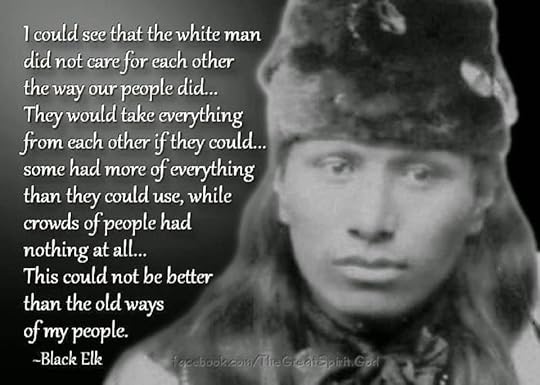
The Tuesday Poets are an international group who try to post a poem every Tuesday and take it in turns to edit the main website. If you'd like to see what other Tuesday poets are posting please click over to the hub and take a look!

... I looked below me where the earth was silent in a sick green light, and saw the hills look up afraid and the grasses on the hills and all the animals; and everywhere about me were the cries of frightened birds and sounds of fleeing wings. I was the chief of all the heavens riding there, and when I looked behind me, all the twelve black horses reared and plunged and thundered and their manes and tails were whirling hail and their nostrils snorted lightning. And when I looked below again, I saw the slant hail falling and the long, sharp rain, and where we passed, the trees bowed low and all the hills were dim.'

In my research into the mythologies of North America I've discovered an anthology compiled by Jerome Rothenberg called Technicians of the Sacred, published in 1968.

It was very difficult to get hold of in the UK and most copies were beyond my price-range, but eventually I found a cheap second hand edition. It was worth the trouble - there are some real gems in this book - both poetry and prose. The above is from a long piece in three sections which seems to describe some kind of apocalypse and it has a psalm-like quality. It's been written down as prose, but is clearly oral poetry.
'Black Elk' was born in 1863 and died in 1950. He was a very famous visionary of the Oglala Lakota. The vision recorded above came to him when he was 9 years old. His words have been much quoted. This is one of my favourites - he got it right!

The Tuesday Poets are an international group who try to post a poem every Tuesday and take it in turns to edit the main website. If you'd like to see what other Tuesday poets are posting please click over to the hub and take a look!
Published on April 27, 2015 15:30
April 25, 2015
Millie and Bird - Tales of Paradise - Avril Joy
In 2012, Avril Joy won the inaugural Costa Prize for short fiction - the first Indie author to win a Costa Award (or any of the major literary prizes). It was a story that had begun in a workshop, when Avril was given the postcard of a portrait in the National Gallery by
Barbara Skingle
called 'Katherine and Millie'.

Initially, Avril wrote a poem, but the image wouldn't leave her and when she got home a story began to form in her mind. The names became reversed - Millie became the girl, not the name of the bird. The story was also informed by Avril's experience of working in women's prisons with vulnerable individuals. Avril's first reaction to the postcard had been 'I know that girl'. In Avril's story Millie comes from a fractured family with a mother dependent on alcohol. But Millie and her sister are bright girls who look after each other.
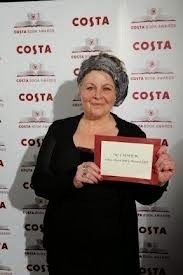 Although Avril won the Costa award, and has been shortlisted for a number of other significant prizes, it hasn't made it any easier to find a publisher for her fiction. It's not a case these days of good writing making it into print on its own merits - you have to write for the market and that means sacrificing your own ideas to commercial formulas. Instead, Avril began a series of short stories set in the world of Millie and Bird, exploring the characters who live on Eden Row in a place called Paradise, which, like the many Paradise housing estates that dot the industrial landscape, says more about the optimism of the builders than the reality of the location. What caught me from the beginning was the use of a quote from one of Katherine Mansfield's letters inside the front cover:
Although Avril won the Costa award, and has been shortlisted for a number of other significant prizes, it hasn't made it any easier to find a publisher for her fiction. It's not a case these days of good writing making it into print on its own merits - you have to write for the market and that means sacrificing your own ideas to commercial formulas. Instead, Avril began a series of short stories set in the world of Millie and Bird, exploring the characters who live on Eden Row in a place called Paradise, which, like the many Paradise housing estates that dot the industrial landscape, says more about the optimism of the builders than the reality of the location. What caught me from the beginning was the use of a quote from one of Katherine Mansfield's letters inside the front cover:
"How hard it is to escape from places. However carefully one goes they hold you - you leave little bits of yourself fluttering on the fences - like rags and shreds of your very life."
The characters in the title story, Millie and Bird, re-appear through the pages and tell their own stories of attachment and escape. Tales of Paradise isn't a novel - it's a series of linked stories - but each one can also stand alone.
 Avril signing my copyOne of my favourite stories is called 'Waking the Dead', and it's about Deena Box and the day that her son Sean (one of Millie's school friends), dives into the legendary Drowning Pool. Deena is unhappy in her marriage, fantasising 'about meeting a man who also loved Haagen Dazs and who would make love to her, smearing it all over her body, then slowly, deliberately, licking it off. Her husband Tot was not that man.' She becomes obsessed with a man called Wolf who lives in the woods.
Avril signing my copyOne of my favourite stories is called 'Waking the Dead', and it's about Deena Box and the day that her son Sean (one of Millie's school friends), dives into the legendary Drowning Pool. Deena is unhappy in her marriage, fantasising 'about meeting a man who also loved Haagen Dazs and who would make love to her, smearing it all over her body, then slowly, deliberately, licking it off. Her husband Tot was not that man.' She becomes obsessed with a man called Wolf who lives in the woods.
The stories are full of wonderful characters - the man who cross-dresses on his allotment, Patsy who is a compulsive shop-lifter, Bridger the traumatised soldier - but it's the young people who hook you in with their courage and ingenuity. They are incredibly fragile, living on the edge of a precipice - just one momentary loss of balance can lead to disaster. At the centre of the book is a love affair - Millie's sister Isa and her teenage boyfriend Otis. I was holding my breath for them until the last page of the book.
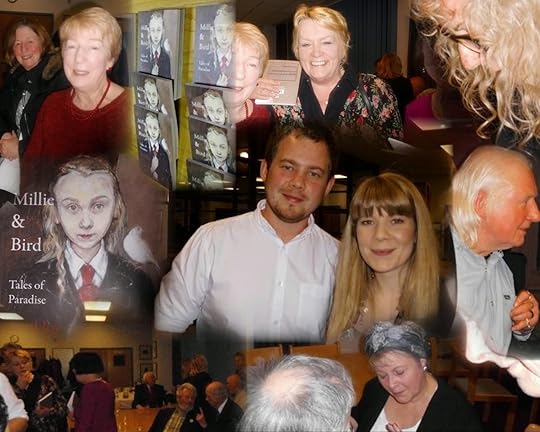 Images from Avril's launch party, taken by Wendy Robertson.Despite the blindingly brilliant quality of the stories, none of the big publishers would take them. It's frustrating that they just aren't interested in short fiction. But one of the north's wonderful small presses,
Iron,
with editor Peter Mortimer, was more imaginative and '
Millie and Bird: Tales of Paradise'
was launched last month. Artist
Barbara Skingle
was very happy to allow Avril to use her portrait as the cover.
Images from Avril's launch party, taken by Wendy Robertson.Despite the blindingly brilliant quality of the stories, none of the big publishers would take them. It's frustrating that they just aren't interested in short fiction. But one of the north's wonderful small presses,
Iron,
with editor Peter Mortimer, was more imaginative and '
Millie and Bird: Tales of Paradise'
was launched last month. Artist
Barbara Skingle
was very happy to allow Avril to use her portrait as the cover.

Get it while you still can!
Some of Avril's other books:
Avril's website
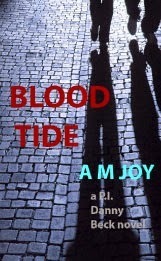 A gripping thriller
A gripping thriller
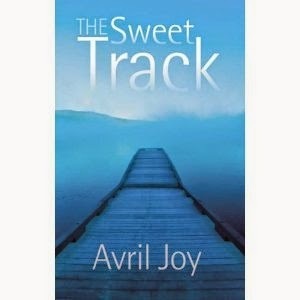 Avril's first, award-winning novel
Avril's first, award-winning novel
 A tale of love and fear.
A tale of love and fear.

Initially, Avril wrote a poem, but the image wouldn't leave her and when she got home a story began to form in her mind. The names became reversed - Millie became the girl, not the name of the bird. The story was also informed by Avril's experience of working in women's prisons with vulnerable individuals. Avril's first reaction to the postcard had been 'I know that girl'. In Avril's story Millie comes from a fractured family with a mother dependent on alcohol. But Millie and her sister are bright girls who look after each other.
 Although Avril won the Costa award, and has been shortlisted for a number of other significant prizes, it hasn't made it any easier to find a publisher for her fiction. It's not a case these days of good writing making it into print on its own merits - you have to write for the market and that means sacrificing your own ideas to commercial formulas. Instead, Avril began a series of short stories set in the world of Millie and Bird, exploring the characters who live on Eden Row in a place called Paradise, which, like the many Paradise housing estates that dot the industrial landscape, says more about the optimism of the builders than the reality of the location. What caught me from the beginning was the use of a quote from one of Katherine Mansfield's letters inside the front cover:
Although Avril won the Costa award, and has been shortlisted for a number of other significant prizes, it hasn't made it any easier to find a publisher for her fiction. It's not a case these days of good writing making it into print on its own merits - you have to write for the market and that means sacrificing your own ideas to commercial formulas. Instead, Avril began a series of short stories set in the world of Millie and Bird, exploring the characters who live on Eden Row in a place called Paradise, which, like the many Paradise housing estates that dot the industrial landscape, says more about the optimism of the builders than the reality of the location. What caught me from the beginning was the use of a quote from one of Katherine Mansfield's letters inside the front cover:"How hard it is to escape from places. However carefully one goes they hold you - you leave little bits of yourself fluttering on the fences - like rags and shreds of your very life."
The characters in the title story, Millie and Bird, re-appear through the pages and tell their own stories of attachment and escape. Tales of Paradise isn't a novel - it's a series of linked stories - but each one can also stand alone.
 Avril signing my copyOne of my favourite stories is called 'Waking the Dead', and it's about Deena Box and the day that her son Sean (one of Millie's school friends), dives into the legendary Drowning Pool. Deena is unhappy in her marriage, fantasising 'about meeting a man who also loved Haagen Dazs and who would make love to her, smearing it all over her body, then slowly, deliberately, licking it off. Her husband Tot was not that man.' She becomes obsessed with a man called Wolf who lives in the woods.
Avril signing my copyOne of my favourite stories is called 'Waking the Dead', and it's about Deena Box and the day that her son Sean (one of Millie's school friends), dives into the legendary Drowning Pool. Deena is unhappy in her marriage, fantasising 'about meeting a man who also loved Haagen Dazs and who would make love to her, smearing it all over her body, then slowly, deliberately, licking it off. Her husband Tot was not that man.' She becomes obsessed with a man called Wolf who lives in the woods.The stories are full of wonderful characters - the man who cross-dresses on his allotment, Patsy who is a compulsive shop-lifter, Bridger the traumatised soldier - but it's the young people who hook you in with their courage and ingenuity. They are incredibly fragile, living on the edge of a precipice - just one momentary loss of balance can lead to disaster. At the centre of the book is a love affair - Millie's sister Isa and her teenage boyfriend Otis. I was holding my breath for them until the last page of the book.
 Images from Avril's launch party, taken by Wendy Robertson.Despite the blindingly brilliant quality of the stories, none of the big publishers would take them. It's frustrating that they just aren't interested in short fiction. But one of the north's wonderful small presses,
Iron,
with editor Peter Mortimer, was more imaginative and '
Millie and Bird: Tales of Paradise'
was launched last month. Artist
Barbara Skingle
was very happy to allow Avril to use her portrait as the cover.
Images from Avril's launch party, taken by Wendy Robertson.Despite the blindingly brilliant quality of the stories, none of the big publishers would take them. It's frustrating that they just aren't interested in short fiction. But one of the north's wonderful small presses,
Iron,
with editor Peter Mortimer, was more imaginative and '
Millie and Bird: Tales of Paradise'
was launched last month. Artist
Barbara Skingle
was very happy to allow Avril to use her portrait as the cover. 
Get it while you still can!
Some of Avril's other books:
Avril's website
 A gripping thriller
A gripping thriller Avril's first, award-winning novel
Avril's first, award-winning novel A tale of love and fear.
A tale of love and fear.
Published on April 25, 2015 13:32
April 20, 2015
Tuesday Poem: In the Poetry Pavilion at the London Book Fair
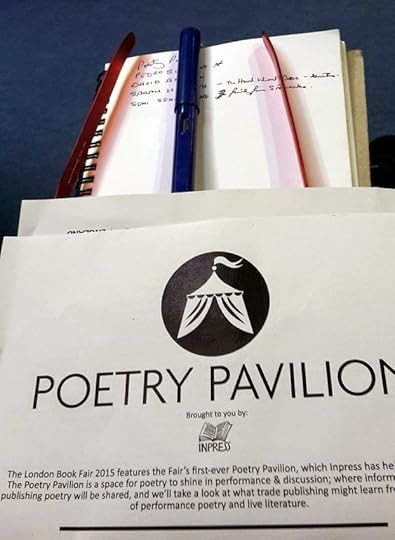
For the first time at the London Book Fair there was a Poetry Pavilion. It seems scandalous that one of the world's biggest book events has not had a dedicated poetry slot until now. For quite a few years the big publishers, who dominate book fairs, have not been publishing poetry - Faber is one of the few - and the small presses, who specialise, just don't have the money to book spaces. This year the poetry distributor, Inpress, who handle distribution for small presses, booked a big area, designated The Poetry Pavilion, with smaller booths for individual presses, and organised a programme of events across all three days of the Fair.
 The London Book Fair is vast - this is only a very small part of it.It was my first time at the LBF (authors haven't exactly been welcome either, until recently) and I thoroughly enjoyed it. Emma Press - a new and exciting development in poetry publishing - were there, alongside Carcanet, Seren, Valley Press, Penned in the Margins and Nine Arches.
The London Book Fair is vast - this is only a very small part of it.It was my first time at the LBF (authors haven't exactly been welcome either, until recently) and I thoroughly enjoyed it. Emma Press - a new and exciting development in poetry publishing - were there, alongside Carcanet, Seren, Valley Press, Penned in the Margins and Nine Arches.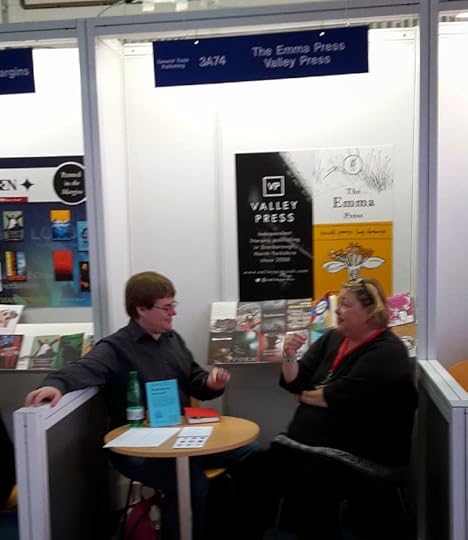 Emma Press and Valley Press, sharing a stand.The Canal Laureate,
poet Jo Bell
, was there to launch her new collection - Kith - and, despite a barrage of noise from the surrounding stands, managed to give a brilliant reading from it. The competition was fierce! Jo has recorded some of the poems on SoundCloud, which you can hear without the literary Oicks of the LBF quacking in the background (a reference to the ducks in what is - possibly - her most notorious poem).
Emma Press and Valley Press, sharing a stand.The Canal Laureate,
poet Jo Bell
, was there to launch her new collection - Kith - and, despite a barrage of noise from the surrounding stands, managed to give a brilliant reading from it. The competition was fierce! Jo has recorded some of the poems on SoundCloud, which you can hear without the literary Oicks of the LBF quacking in the background (a reference to the ducks in what is - possibly - her most notorious poem).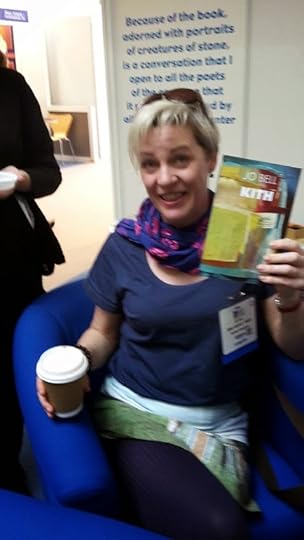
Sophie Hannah was also launching her collection, Marrying the Ugly Millionaire (Carcanet), with similar disadvantages. Next year the Poetry Pavilion will have to get a better sound system, or a quieter location.
It was a place to chat to people (the Poetry Society's Judith Palmer was there) and make new friends. This is Deborah Hodgett - poet and blogger @ The Beautiful Music of Words .
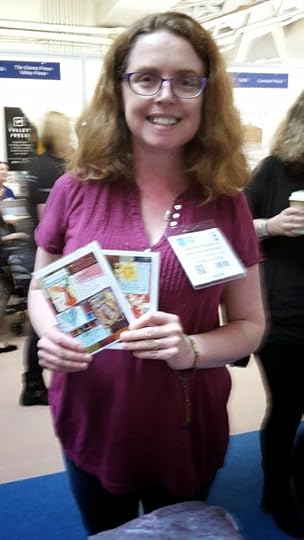
There was a Mexican theme at this year's LBF and, as well as launching a new edition of Octavio Paz, contemporary poet Pedro Seranno was reading from his new bilingual collection Peatlands (Arc). There were also readings by Simon Barraclough and Sarah Hesketh, who read from her new collection The Hard Word Box, which was written from a residency working with people suffering from Dementia. This was one of the readings I enjoyed most.
 Simon Barraclough, watched by Judith PalmerOne of the most interesting events from my point of view was a panel discussion with Michael Schmidt of Carcanet, looking at poetry publishing, both past and future, and the role of the editor. Michael takes a 'forestry ecology approach to publishing', believing in cultivation for the long term. This is a rarity in a contemporary industry that increasingly looks to short term profits. I was fascinated by some of the things he said, particularly about editing. The editor, he believes, should not be led by his/her own taste, but should publish a wide variety of poetry which they believe to be good, even if they don't like it. He talked about e-books, which currently account for only 4% of total poetry sales at the moment. Most of the sales are for second copies to be carried around on e-readers by their owners. This rang true for me - I buy poetry collections on paper but the ones I love I also have on Kindle.
Simon Barraclough, watched by Judith PalmerOne of the most interesting events from my point of view was a panel discussion with Michael Schmidt of Carcanet, looking at poetry publishing, both past and future, and the role of the editor. Michael takes a 'forestry ecology approach to publishing', believing in cultivation for the long term. This is a rarity in a contemporary industry that increasingly looks to short term profits. I was fascinated by some of the things he said, particularly about editing. The editor, he believes, should not be led by his/her own taste, but should publish a wide variety of poetry which they believe to be good, even if they don't like it. He talked about e-books, which currently account for only 4% of total poetry sales at the moment. Most of the sales are for second copies to be carried around on e-readers by their owners. This rang true for me - I buy poetry collections on paper but the ones I love I also have on Kindle.Michael asked some awkward questions. One of them was about university creative writing programmes. Are we churning out poets faster than we are churning out readers? He also questioned the ominous trend for the Arts Council to fund poetry on a book by book basis, rather than funding the press itself. That puts the Arts Council firmly in an editorial mode, which Michael thinks is unacceptable.
 One of the other panels with Jane Commane (Nine Arches Press), Tom Chivers (Penned in the Margins), Amy Wack (Seren) and Sheila Bounford (Inpress)I had a wonderful three days listening to poetry and to poets and editors talking about poetry. Can't wait for next year!
One of the other panels with Jane Commane (Nine Arches Press), Tom Chivers (Penned in the Margins), Amy Wack (Seren) and Sheila Bounford (Inpress)I had a wonderful three days listening to poetry and to poets and editors talking about poetry. Can't wait for next year!And then there was wine ........

Published on April 20, 2015 13:55
April 16, 2015
London Book Fair 2015
I'm currently at the London Book Fair - for the first time and absolutely loving it! Why have publishers and agents kept it to themselves for long? Now the author invasion has begun! Some really interesting things going on. I'm at Author HQ and The Poetry Pavilion and tomorrow I'm at Foyles Bookshop for the Indie ReCon event organised by the Alliance of Independent Authors. In the afternoon, from 4.30, we're selling books at the Foyles' independent book fair and later there will be wine! Anyone in the area, please come and see us. Neil will also be there, selling books.
No pictures, or proper blog because my computer has decided it isn't compatible with the hotel wifi (I blame Windows 8) and so I can only do what is possible on my mobile phone - but I will be blogging it all as soon as I get home.
No pictures, or proper blog because my computer has decided it isn't compatible with the hotel wifi (I blame Windows 8) and so I can only do what is possible on my mobile phone - but I will be blogging it all as soon as I get home.
Published on April 16, 2015 08:05
April 12, 2015
Looking for my Family in the City of the Dead
Cimatero - Genoa
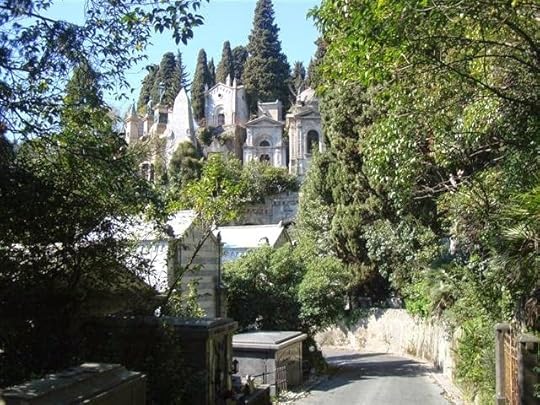 The hillside, among the tombs. A wonderful place to spend the dayMy Italian great-grandmother is a mystery. All I know about her is her name - Francesca Maria Theresa Nogaro - and not even that is certain. Although she was always known as Fanny, her christian names could be in a different order. And then there's the spelling of the surname. The family were fairly sure that was how she wrote it when they entered it on the death certificate, but no one knew for sure.
The hillside, among the tombs. A wonderful place to spend the dayMy Italian great-grandmother is a mystery. All I know about her is her name - Francesca Maria Theresa Nogaro - and not even that is certain. Although she was always known as Fanny, her christian names could be in a different order. And then there's the spelling of the surname. The family were fairly sure that was how she wrote it when they entered it on the death certificate, but no one knew for sure.
The rest is legend. She was supposed to have been the daughter of a ships' Chandler and my great-grandfather, who was the captain of a ship, apparently fell in love with her on the quayside, married her and transported her to England within the space of three weeks. My grandfather used to talk about the cousins he had in Genoa - his mother was still in touch with them at that time - but after she died the family connection was broken.
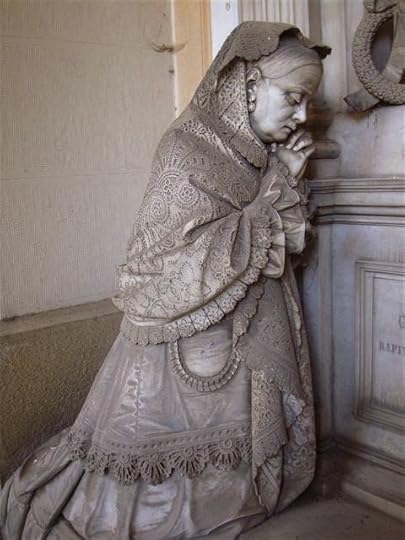 Woman mourning her husband.
Woman mourning her husband.
 A teardrop beautifully carved.So, being in Italy for Easter, I decided it was time to visit the old cemetery in Genoa to see if I could find any of my relatives. My gt grandmother was born in the 1860s so surely some of the family would have died there? But I hadn't realised just how big Cimatero is. It's the size of a city and has a similar population, though they're all very quiet.
A teardrop beautifully carved.So, being in Italy for Easter, I decided it was time to visit the old cemetery in Genoa to see if I could find any of my relatives. My gt grandmother was born in the 1860s so surely some of the family would have died there? But I hadn't realised just how big Cimatero is. It's the size of a city and has a similar population, though they're all very quiet.
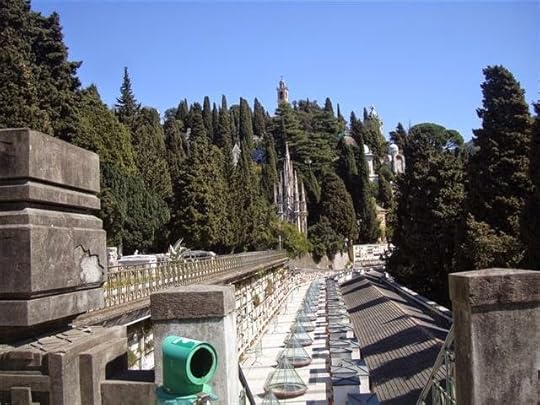 More modern interments are on the roof - these are repositories for ashes.
More modern interments are on the roof - these are repositories for ashes.
In the main building, there are endless corridors piled high on either side with the dead in their marble drawers.
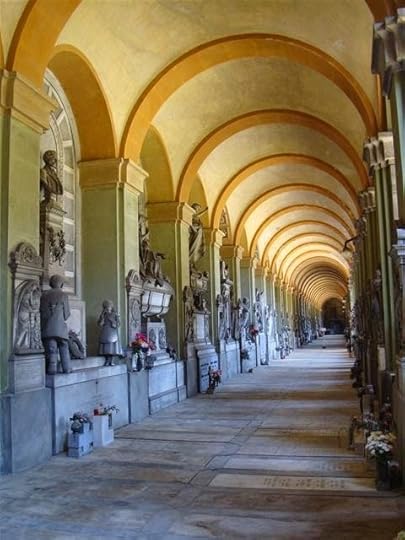
And you are walking on crypts underfoot too. Some of them a little wobbly. You have to watch where you tread. Someone here must have had a nasty surprise!
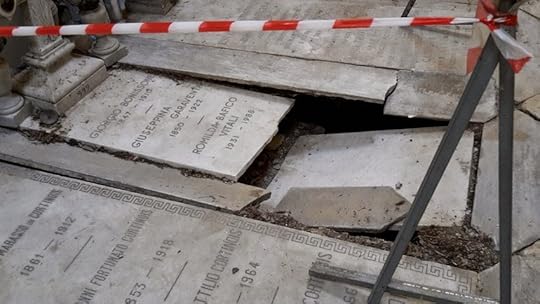
The sculpture on some of the tombs is amazing. This was Neil's main interest - particularly as some of the work was carried out in Pietrasanta by the skilled artisans and sculptors that have worked in this small marble town for hundreds of years. Here are just a few of the most spectacular.
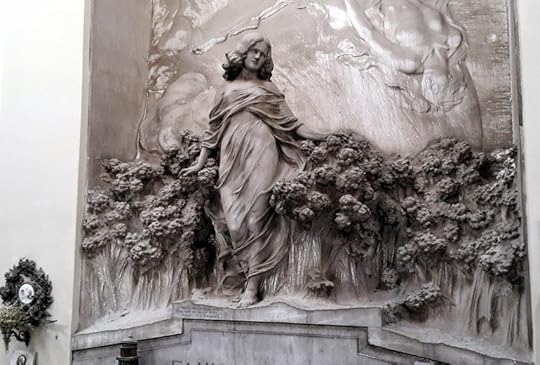
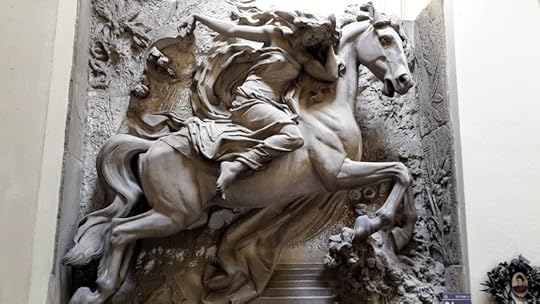
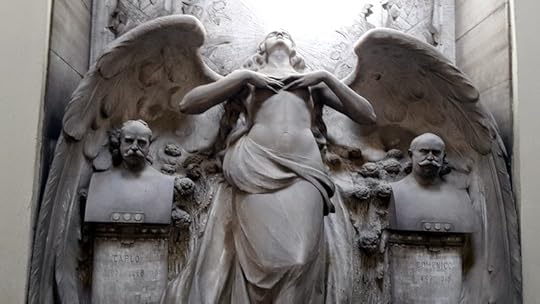
The quality of the carving and the detail is amazing. This one was of a young woman standing outside a door with a symbolic egg-timer on it. Every minute detail of her clothing - even her wedding ring - was perfectly carved.
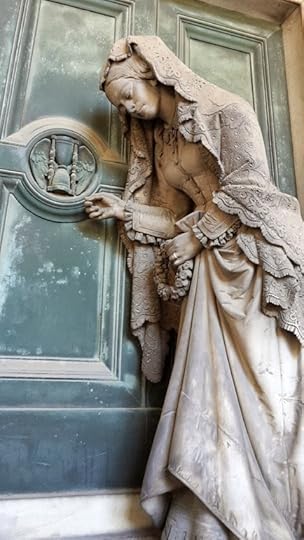
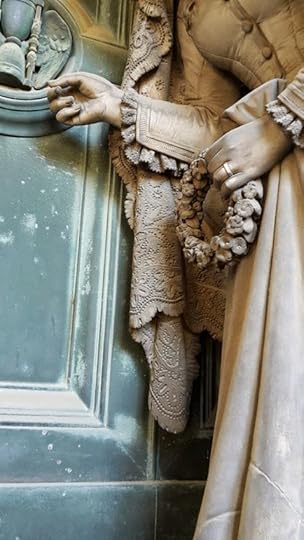

Out on the hillside there are avenues of family tombs like little houses.
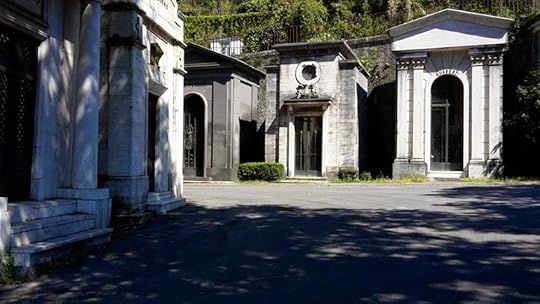 Some of the more modest family tombs.Some of them are very posh, with iron railings and chapels and stained glass windows. Many of them have not been maintained for years, presumably because the families have moved away, died out, or simply run out of money.
Some of the more modest family tombs.Some of them are very posh, with iron railings and chapels and stained glass windows. Many of them have not been maintained for years, presumably because the families have moved away, died out, or simply run out of money.
 This is the rather neglected exterior of one chapel tomb.
This is the rather neglected exterior of one chapel tomb.
 This is the interior, taken through the broken door. We had a picnic somewhere in the cypress groves, on the steps of a grand mausoleum.
This is the interior, taken through the broken door. We had a picnic somewhere in the cypress groves, on the steps of a grand mausoleum.
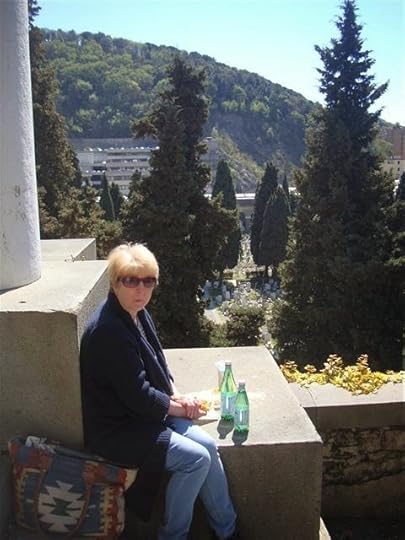
Sadly, even among the more modern graves, I found no record of my gt grandmother's family. But it would have been like looking for a needle in a haystack. Next time I will have to consult the official records first! Every grave is numbered, so someone, somewhere in the Great Italian Bureaucracy must know who is buried where.
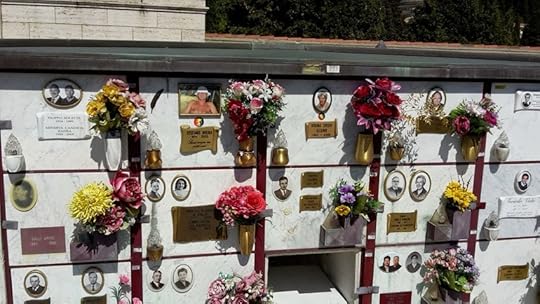 The more modern dead in their marble drawers. I love the photographs.
The more modern dead in their marble drawers. I love the photographs.
 The hillside, among the tombs. A wonderful place to spend the dayMy Italian great-grandmother is a mystery. All I know about her is her name - Francesca Maria Theresa Nogaro - and not even that is certain. Although she was always known as Fanny, her christian names could be in a different order. And then there's the spelling of the surname. The family were fairly sure that was how she wrote it when they entered it on the death certificate, but no one knew for sure.
The hillside, among the tombs. A wonderful place to spend the dayMy Italian great-grandmother is a mystery. All I know about her is her name - Francesca Maria Theresa Nogaro - and not even that is certain. Although she was always known as Fanny, her christian names could be in a different order. And then there's the spelling of the surname. The family were fairly sure that was how she wrote it when they entered it on the death certificate, but no one knew for sure.The rest is legend. She was supposed to have been the daughter of a ships' Chandler and my great-grandfather, who was the captain of a ship, apparently fell in love with her on the quayside, married her and transported her to England within the space of three weeks. My grandfather used to talk about the cousins he had in Genoa - his mother was still in touch with them at that time - but after she died the family connection was broken.
 Woman mourning her husband.
Woman mourning her husband. A teardrop beautifully carved.So, being in Italy for Easter, I decided it was time to visit the old cemetery in Genoa to see if I could find any of my relatives. My gt grandmother was born in the 1860s so surely some of the family would have died there? But I hadn't realised just how big Cimatero is. It's the size of a city and has a similar population, though they're all very quiet.
A teardrop beautifully carved.So, being in Italy for Easter, I decided it was time to visit the old cemetery in Genoa to see if I could find any of my relatives. My gt grandmother was born in the 1860s so surely some of the family would have died there? But I hadn't realised just how big Cimatero is. It's the size of a city and has a similar population, though they're all very quiet. More modern interments are on the roof - these are repositories for ashes.
More modern interments are on the roof - these are repositories for ashes.In the main building, there are endless corridors piled high on either side with the dead in their marble drawers.

And you are walking on crypts underfoot too. Some of them a little wobbly. You have to watch where you tread. Someone here must have had a nasty surprise!

The sculpture on some of the tombs is amazing. This was Neil's main interest - particularly as some of the work was carried out in Pietrasanta by the skilled artisans and sculptors that have worked in this small marble town for hundreds of years. Here are just a few of the most spectacular.



The quality of the carving and the detail is amazing. This one was of a young woman standing outside a door with a symbolic egg-timer on it. Every minute detail of her clothing - even her wedding ring - was perfectly carved.



Out on the hillside there are avenues of family tombs like little houses.
 Some of the more modest family tombs.Some of them are very posh, with iron railings and chapels and stained glass windows. Many of them have not been maintained for years, presumably because the families have moved away, died out, or simply run out of money.
Some of the more modest family tombs.Some of them are very posh, with iron railings and chapels and stained glass windows. Many of them have not been maintained for years, presumably because the families have moved away, died out, or simply run out of money. This is the rather neglected exterior of one chapel tomb.
This is the rather neglected exterior of one chapel tomb.  This is the interior, taken through the broken door. We had a picnic somewhere in the cypress groves, on the steps of a grand mausoleum.
This is the interior, taken through the broken door. We had a picnic somewhere in the cypress groves, on the steps of a grand mausoleum.
Sadly, even among the more modern graves, I found no record of my gt grandmother's family. But it would have been like looking for a needle in a haystack. Next time I will have to consult the official records first! Every grave is numbered, so someone, somewhere in the Great Italian Bureaucracy must know who is buried where.
 The more modern dead in their marble drawers. I love the photographs.
The more modern dead in their marble drawers. I love the photographs.
Published on April 12, 2015 03:26
April 6, 2015
Tuesday Poem: Ashes - Tara Divilly and Derek Walcott

and in the salt chuckle of rocks
with their sea pools, there was the sound
like a rumour without any echo
of History, really beginning.
Sculpture and photograph, Tara Divilly
Text, Derek Walcott from The Sea is History
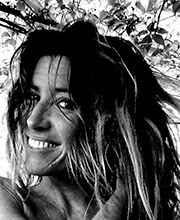
This image and the accompanying lines of poetry are part of Tara Divilly's new exhibition, called 'Ashes', at the Ferrari Art Gallery in Vevey, Switzerland. Tara is from Reunion and works in the Studio Sem in Pietrasanta. You can see more of her work at www.taradivilly.com
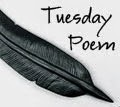 The Tuesday Poets are an international group who try to post a poem every Tuesday and take it in turns to edit the main website. We're all very different. If you'd like to see what the other Tuesday Poets are posting, please click on this link.
The Tuesday Poets are an international group who try to post a poem every Tuesday and take it in turns to edit the main website. We're all very different. If you'd like to see what the other Tuesday Poets are posting, please click on this link.
Published on April 06, 2015 15:30
April 4, 2015
Celebrating Pasqua and Pasquetta in Italy
They celebrate all the Christian (and some Pagan) festivals in carnival style here. This year we managed to be in Pietrasanta for the Good Friday procession, acting out the whole story of the Crucifixion and Resurrection in spectacular style. The whole town was involved - either as actors or marshalls or stage setters and everyone else turned out to watch.
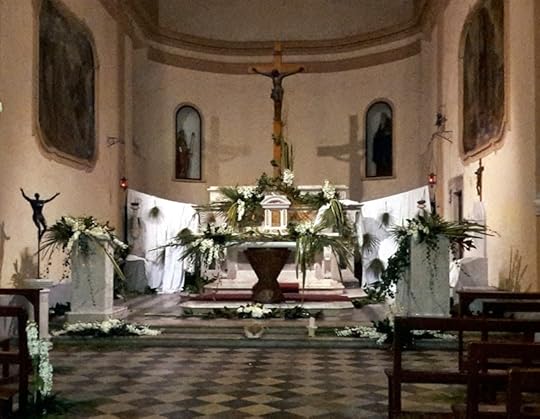 The church decked for EasterThe streets were crammed as we followed the action from one location to the next. This is the stage set for The Last Supper - I was so lost in the crowd by the time the actors got there I couldn't see a thing!
The church decked for EasterThe streets were crammed as we followed the action from one location to the next. This is the stage set for The Last Supper - I was so lost in the crowd by the time the actors got there I couldn't see a thing!
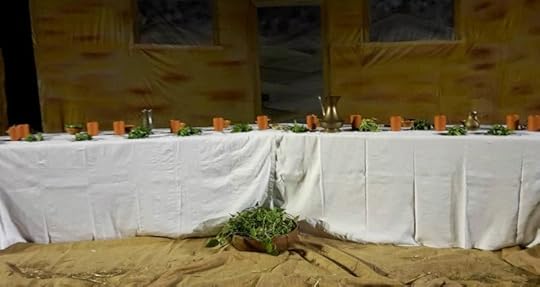
Then the Garden of Gethsemane, tucked away in a corner of the car park.
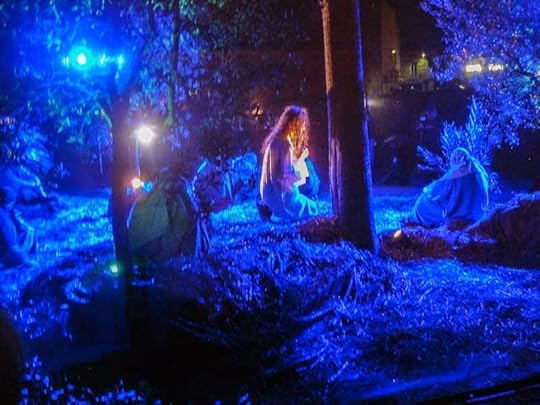
At the end of the main street a centurion was waiting with his cohorts to arrest Jesus (a very hot looking Italian with beautiful hair which he apparently keeps long for his annual role).
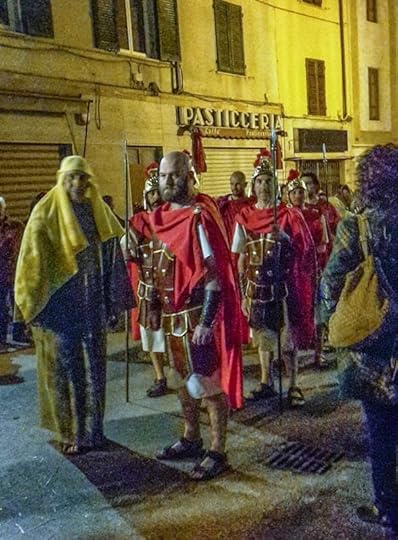 Centurion with Judas Iscariot and soldiers
Centurion with Judas Iscariot and soldiers
Behind them the extras, including quite a lot of children, queued to join the procession.
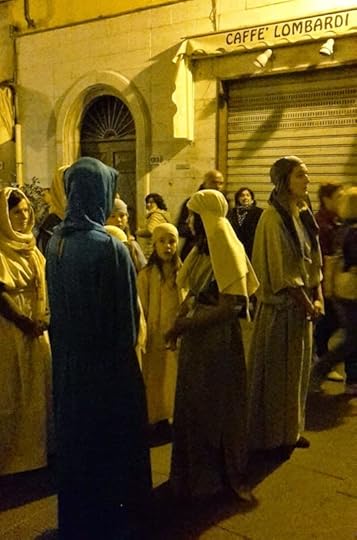
Pontius Pilate waited in the shadows further up the street, ready to do his bit of hand-washing.
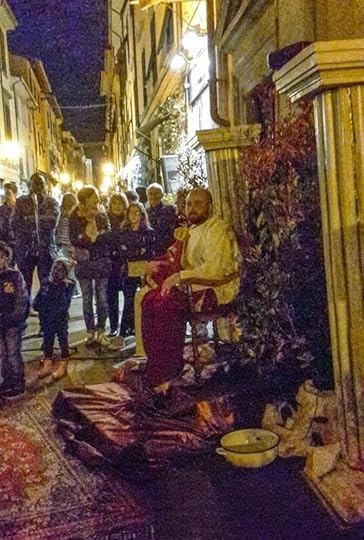
Meanwhile I hurried ahead of the crowd to find a good place in the main piazza where I could watch the Crucifixion and the Resurrection. Jesus entered at the head of the procession, flanked by soldiers, carrying the cross.
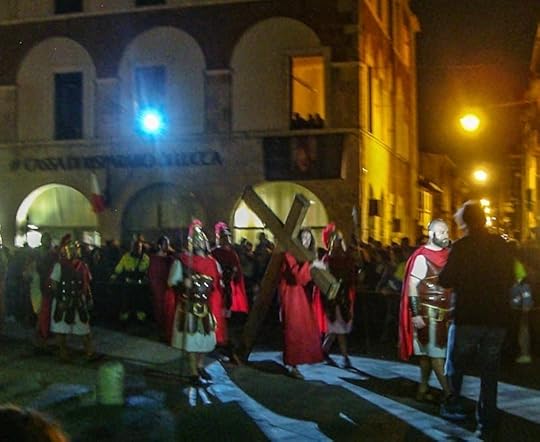
The Crucifixion was enacted on the steps of Sant'Agostino and was very moving, even for an aetheist, with Bach's St Matthew Passion playing over the sound system. Jesus was, after all, a political prisoner, considered a terrorist by the Roman conquerors of Palestine, executed for his beliefs and for inciting others to believe. Times don't change much.
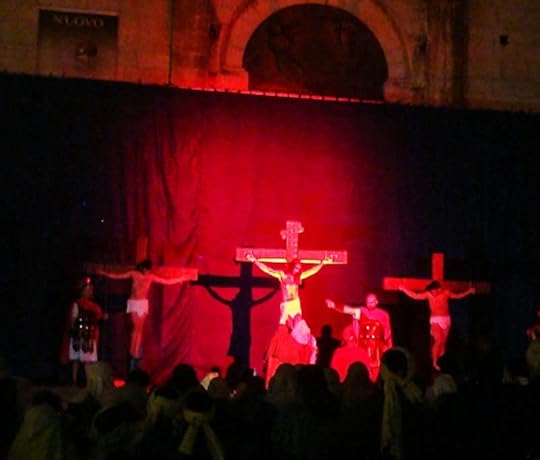
Then the small group around the cross took the dead Jesus down and carried him to the tomb on the steps of the Duomo. On Sunday they will roll back the door and he will emerge in another pageant with pealing bells and joyful music.
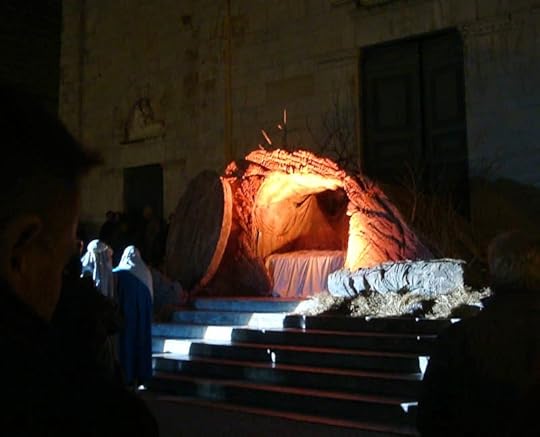
Meanwhile we had a hot chocolate and sticky cakes at the local patisserie, Dazzi's, even though it was after midnight, surrounded by chocolate bunnies and eggs, from a completely different tradition. This is the most beautiful place to live.
Tomorrow is Easter Sunday, Pasqua, when families will gather for a huge roast lunch involving lamb, though judging from the examples on the supermarket shelves the Sardinian lambs are the size of cats. Then on Monday - Pasquetta - they will all head for the hills equipped with picnics, or meet at the high 'rifugios' on the mountain slopes for gargantuan al fresco lunches and a bit of walking. Not sure what we are going to do as it's thundering, with lightning and pouring with rain at the moment! Happy Easter everyone - or as they say here - Buona Pasqua!
 The church decked for EasterThe streets were crammed as we followed the action from one location to the next. This is the stage set for The Last Supper - I was so lost in the crowd by the time the actors got there I couldn't see a thing!
The church decked for EasterThe streets were crammed as we followed the action from one location to the next. This is the stage set for The Last Supper - I was so lost in the crowd by the time the actors got there I couldn't see a thing!
Then the Garden of Gethsemane, tucked away in a corner of the car park.

At the end of the main street a centurion was waiting with his cohorts to arrest Jesus (a very hot looking Italian with beautiful hair which he apparently keeps long for his annual role).
 Centurion with Judas Iscariot and soldiers
Centurion with Judas Iscariot and soldiersBehind them the extras, including quite a lot of children, queued to join the procession.

Pontius Pilate waited in the shadows further up the street, ready to do his bit of hand-washing.

Meanwhile I hurried ahead of the crowd to find a good place in the main piazza where I could watch the Crucifixion and the Resurrection. Jesus entered at the head of the procession, flanked by soldiers, carrying the cross.

The Crucifixion was enacted on the steps of Sant'Agostino and was very moving, even for an aetheist, with Bach's St Matthew Passion playing over the sound system. Jesus was, after all, a political prisoner, considered a terrorist by the Roman conquerors of Palestine, executed for his beliefs and for inciting others to believe. Times don't change much.

Then the small group around the cross took the dead Jesus down and carried him to the tomb on the steps of the Duomo. On Sunday they will roll back the door and he will emerge in another pageant with pealing bells and joyful music.

Meanwhile we had a hot chocolate and sticky cakes at the local patisserie, Dazzi's, even though it was after midnight, surrounded by chocolate bunnies and eggs, from a completely different tradition. This is the most beautiful place to live.
Tomorrow is Easter Sunday, Pasqua, when families will gather for a huge roast lunch involving lamb, though judging from the examples on the supermarket shelves the Sardinian lambs are the size of cats. Then on Monday - Pasquetta - they will all head for the hills equipped with picnics, or meet at the high 'rifugios' on the mountain slopes for gargantuan al fresco lunches and a bit of walking. Not sure what we are going to do as it's thundering, with lightning and pouring with rain at the moment! Happy Easter everyone - or as they say here - Buona Pasqua!
Published on April 04, 2015 06:09
April 1, 2015
Jane Davis: Life Imitating Art
This week - as I'm on holiday in Italy - there's a guest post by the wonderful novelist Jane Davis. Her first novel 'Half Truths and White Lies', published by Black Swan, won the Daily Mail first novel award; 'I Stopped Time' and 'Funeral for an Owl' are among my favourite reads. This month, Jane has a new novel out in print and e-book form - 'An Unknown Woman' - so I asked her to tell us about some of the strange events that happened while she was writing the book.
‘If we are what we own, who are we when we own nothing?’
Words Pulled From a Burning WreckageThoughts on the writing of An Unknown Woman
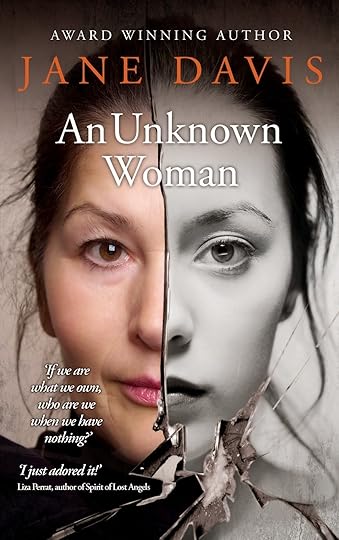
A novel, wrote Henry James for an 1884 magazine article, is “a direct impression of life.” An Unknown Woman is probably the most personal novel I have written to date.
In 2013, I took the decision to cut back on paid work, which meant selling the car and ridding myself of a lot of material baggage. The book is in part an exploration of how material possessions inform our identities. I wanted to tackle the subjects that are relevant to the life I am living now, which bears little resemblance to the life I imagined for myself when I was a child, back when my father told me, “When you’re an adult, you can do exactly as you like.” I consider what it’s like to be childless when the majority of friends have children, even when childlessness is a positive choice; the extension of youth into what was previously thought of as middle age; the feeling of being cut off from adulthood.
The action begins with my main character, Anita, standing outside the house she and her partner have lived in for fifteen years and watching it burn to the ground. It is very recognisably my house. My partner and I joked about how I might be tempting fate. But it was just a joke. We are not terribly superstitious – although I must admit that we’ve had more near misses in the last year than I’m comfortable with. (There may be some truth in the saying, “You attract what you think most about”.)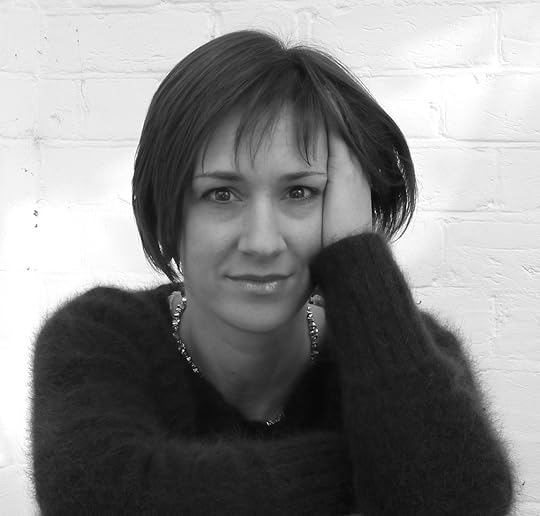 Author Jane Davis
Author Jane Davis
Then in February 2014, three months after I finished chapter one, my sister and her husband lost their house and practically everything they owned to the winter floods. She lived on the island on the Thames that you can see in the first photograph in this article: http://www.dailymail.co.uk/news/article-2555658/UK-weather-16-areas-South-warned-flooding-danger-lives-Armed-Forces-battle-save-homes.html. Over a year after the event they are stuck in limbo, living in a rented house with what little they managed to salvage, still waiting the planning permission to start rebuilding their home - and with it their lives. This shattering event made me question if I should abandon the project. I was writing about an imagined scenario that had become a reality for someone very close to me.
Of course, the same could be said of any book I have written - or may write in the future. My favourite description of fiction is that it is ‘made-up truth’. But the shape of the book I was writing had to change. The other day, I stumbled across this quote: “The writer’s job is to get the main character up the tree, and once they are there, to throw rocks at them.” While Anita finds one hell of a lot of rocks flying in her direction, I chose my ammunition more carefully than I would have done otherwise, replacing a few sharp flints with smooth pebbles.
This certainly wasn’t the first time I have substantially altered the focus of a book during the course of its writing. I’m afraid that anyone who imagines that words show up in the eventual order that they appear on the page of any novel is, in the majority of cases, mistaken. In some ways, the novel in its final form is an illusion. The rabbit pulled out of the hat – or in this case, the few things rescued from the burning house.
Since I don’t plot, my process tends to be very organic. The pivotal moment of a novel may not actually reveal itself until several edits in, or until an editor comments, ‘I see the point that you were trying to make.’ As author Roz Morris says, sometimes it takes a reader to hold the mirror up to your work. Novels by Jane DavisWith my historical novel, I Stopped Time, I introduced a present-day strand when I realised that I would be unable to say everything that I wanted to in the voice of my main character, model turned photographer, Lottie Pye. And so, the revised premise became the story of how the reclusive Sir James Hastings discovers the mother who abandoned him when she leaves him her photographic work in her will.
Novels by Jane DavisWith my historical novel, I Stopped Time, I introduced a present-day strand when I realised that I would be unable to say everything that I wanted to in the voice of my main character, model turned photographer, Lottie Pye. And so, the revised premise became the story of how the reclusive Sir James Hastings discovers the mother who abandoned him when she leaves him her photographic work in her will.
With A Funeral for an Owl, it was while I was ironing out flaws highlighted by a structural editor that I discovered another major issue: I had failed to take account of the fact that it was thirty years since I left school. The behaviour of two of my main characters, both of them teachers, would have been illegal under current Child Protection laws. The stupid thing was that all of the information I needed was available on the local government website, had I realised. Then it struck me that there was a huge opportunity to be had. I could change the focus of the novel: what kind of boy would it take to make two teachers put their jobs on the line? And it gave the plot a new momentum. In the case of An Unknown Woman, the fire quickly becomes the least of Anita’s problems. It is the psychological fall-out and what happens when she is stripped of her armour that drives the narrative forwards. She has to find the answer to the question, ‘If we are what we own, who are we when we own nothing?’ And the answer is that we are not the same. But, as with the altered plot of a novel, there can be positives.
Over to you: Have you ever substantially altered a novel during its writing? Or have you ever written about a subject, only to have something similar happen in your own life?
Author Biography
 Jane Davis lives in Carshalton, Surrey with her Formula 1 obsessed, star-gazing, beer-brewing partner, surrounded by growing piles of paperbacks, CDs and general chaos. She spent her twenties and the first part of her thirties chasing promotions at work, but when Jane achieved what she’d set out to do, she discoveWebsite www.jane-davis.co.ukFacebook https://www.facebook.com/jane.davis.54966Twitter @janedavisauthor Pinterest https://uk.pinterest.com/janeeleanordavi/Buy ebook from Amazon http://goo.gl/EaiKXW
Jane Davis lives in Carshalton, Surrey with her Formula 1 obsessed, star-gazing, beer-brewing partner, surrounded by growing piles of paperbacks, CDs and general chaos. She spent her twenties and the first part of her thirties chasing promotions at work, but when Jane achieved what she’d set out to do, she discoveWebsite www.jane-davis.co.ukFacebook https://www.facebook.com/jane.davis.54966Twitter @janedavisauthor Pinterest https://uk.pinterest.com/janeeleanordavi/Buy ebook from Amazon http://goo.gl/EaiKXW
By paperback from Amazon: http://goo.gl/8AnAz7
Jane is also one of the 7 authors included in Women Writing Women: Outside the Box, available from Amazon and all good e-book retailers.

‘If we are what we own, who are we when we own nothing?’
Words Pulled From a Burning WreckageThoughts on the writing of An Unknown Woman

A novel, wrote Henry James for an 1884 magazine article, is “a direct impression of life.” An Unknown Woman is probably the most personal novel I have written to date.
In 2013, I took the decision to cut back on paid work, which meant selling the car and ridding myself of a lot of material baggage. The book is in part an exploration of how material possessions inform our identities. I wanted to tackle the subjects that are relevant to the life I am living now, which bears little resemblance to the life I imagined for myself when I was a child, back when my father told me, “When you’re an adult, you can do exactly as you like.” I consider what it’s like to be childless when the majority of friends have children, even when childlessness is a positive choice; the extension of youth into what was previously thought of as middle age; the feeling of being cut off from adulthood.
The action begins with my main character, Anita, standing outside the house she and her partner have lived in for fifteen years and watching it burn to the ground. It is very recognisably my house. My partner and I joked about how I might be tempting fate. But it was just a joke. We are not terribly superstitious – although I must admit that we’ve had more near misses in the last year than I’m comfortable with. (There may be some truth in the saying, “You attract what you think most about”.)
 Author Jane Davis
Author Jane DavisThen in February 2014, three months after I finished chapter one, my sister and her husband lost their house and practically everything they owned to the winter floods. She lived on the island on the Thames that you can see in the first photograph in this article: http://www.dailymail.co.uk/news/article-2555658/UK-weather-16-areas-South-warned-flooding-danger-lives-Armed-Forces-battle-save-homes.html. Over a year after the event they are stuck in limbo, living in a rented house with what little they managed to salvage, still waiting the planning permission to start rebuilding their home - and with it their lives. This shattering event made me question if I should abandon the project. I was writing about an imagined scenario that had become a reality for someone very close to me.
Of course, the same could be said of any book I have written - or may write in the future. My favourite description of fiction is that it is ‘made-up truth’. But the shape of the book I was writing had to change. The other day, I stumbled across this quote: “The writer’s job is to get the main character up the tree, and once they are there, to throw rocks at them.” While Anita finds one hell of a lot of rocks flying in her direction, I chose my ammunition more carefully than I would have done otherwise, replacing a few sharp flints with smooth pebbles.
This certainly wasn’t the first time I have substantially altered the focus of a book during the course of its writing. I’m afraid that anyone who imagines that words show up in the eventual order that they appear on the page of any novel is, in the majority of cases, mistaken. In some ways, the novel in its final form is an illusion. The rabbit pulled out of the hat – or in this case, the few things rescued from the burning house.
Since I don’t plot, my process tends to be very organic. The pivotal moment of a novel may not actually reveal itself until several edits in, or until an editor comments, ‘I see the point that you were trying to make.’ As author Roz Morris says, sometimes it takes a reader to hold the mirror up to your work.
 Novels by Jane DavisWith my historical novel, I Stopped Time, I introduced a present-day strand when I realised that I would be unable to say everything that I wanted to in the voice of my main character, model turned photographer, Lottie Pye. And so, the revised premise became the story of how the reclusive Sir James Hastings discovers the mother who abandoned him when she leaves him her photographic work in her will.
Novels by Jane DavisWith my historical novel, I Stopped Time, I introduced a present-day strand when I realised that I would be unable to say everything that I wanted to in the voice of my main character, model turned photographer, Lottie Pye. And so, the revised premise became the story of how the reclusive Sir James Hastings discovers the mother who abandoned him when she leaves him her photographic work in her will.With A Funeral for an Owl, it was while I was ironing out flaws highlighted by a structural editor that I discovered another major issue: I had failed to take account of the fact that it was thirty years since I left school. The behaviour of two of my main characters, both of them teachers, would have been illegal under current Child Protection laws. The stupid thing was that all of the information I needed was available on the local government website, had I realised. Then it struck me that there was a huge opportunity to be had. I could change the focus of the novel: what kind of boy would it take to make two teachers put their jobs on the line? And it gave the plot a new momentum. In the case of An Unknown Woman, the fire quickly becomes the least of Anita’s problems. It is the psychological fall-out and what happens when she is stripped of her armour that drives the narrative forwards. She has to find the answer to the question, ‘If we are what we own, who are we when we own nothing?’ And the answer is that we are not the same. But, as with the altered plot of a novel, there can be positives.
Over to you: Have you ever substantially altered a novel during its writing? Or have you ever written about a subject, only to have something similar happen in your own life?
Author Biography
 Jane Davis lives in Carshalton, Surrey with her Formula 1 obsessed, star-gazing, beer-brewing partner, surrounded by growing piles of paperbacks, CDs and general chaos. She spent her twenties and the first part of her thirties chasing promotions at work, but when Jane achieved what she’d set out to do, she discoveWebsite www.jane-davis.co.ukFacebook https://www.facebook.com/jane.davis.54966Twitter @janedavisauthor Pinterest https://uk.pinterest.com/janeeleanordavi/Buy ebook from Amazon http://goo.gl/EaiKXW
Jane Davis lives in Carshalton, Surrey with her Formula 1 obsessed, star-gazing, beer-brewing partner, surrounded by growing piles of paperbacks, CDs and general chaos. She spent her twenties and the first part of her thirties chasing promotions at work, but when Jane achieved what she’d set out to do, she discoveWebsite www.jane-davis.co.ukFacebook https://www.facebook.com/jane.davis.54966Twitter @janedavisauthor Pinterest https://uk.pinterest.com/janeeleanordavi/Buy ebook from Amazon http://goo.gl/EaiKXWBy paperback from Amazon: http://goo.gl/8AnAz7
Jane is also one of the 7 authors included in Women Writing Women: Outside the Box, available from Amazon and all good e-book retailers.

Published on April 01, 2015 15:30



